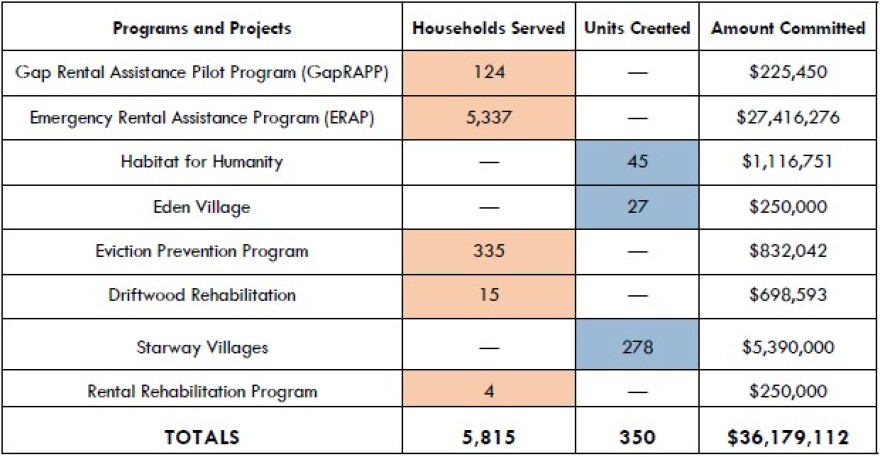Wilmington City Council and New Hanover County Commission now have a clear plan to address the affordable housing crisis impacting the region.
The joint city-county Workforce Housing Advisory Committee (WHAC) gave the presentation, starting with some background and some data.
Chair Sharm Brantley gave the city accolades for its investments.
“The city dedicates a staff of six, including two certified housing counselors, and an additional two staff members to administer and manage the city's housing loan portfolio totaling over $20 million," she said.
She also pointed to city and county investments like gap financing for Starway Village, which will bring nearly 278 affordable apartments to Carolina Beach Road, calling it “our most historic commitment to affordable housing.”
She added another laurel: “The city council enacted a policy to dedicate one cent of the property tax to affordable and workforce housing ongoing: that is, into the future.”
But despite these investments, there's bad news: the need for affordable housing is growing, and more than a third of renters are housing burdened — meaning they spend more than 30% of their income, usually pre-tax income, on housing.
The WHAC said there are five recommendations that could help turn that around.
Recommendation: Creation of a Dedicated Affordable Housing Development Fund
The WHAC annual report called for the development of an affordable housing development fund that would issue gap financing and funding for affordable housing development projects.
“We understand both the city and county have limited funds for these types of projects,” Brantley said. “But this dedicated funding source could attract affordable housing developers who need additional funding to close the gap and project costs.”
WHAC calls for this fund to be available on a rolling basis, particularly as construction costs increased by 14.1% in 2022 by some estimates.
“We have seen similar funds in other communities that partner with local foundations, private funding, and endowments to leverage this capital from various sources,” Brantley said, pointing to Greensboro, Charlotte, and Asheville as examples.
Recommendation: Policy shifts on zoning and resident protections
The committee recommends implementing local policy changes and advocating similar changes at the state level.
This recommendation applies to two major areas: tenant protections and zoning changes, which WHAC calls “land use changes to support diversity in housing options.”
These policy shifts vary but, on tenant protection, it includes income source non-discrimination, which protects those who use Section 8 vouchers. That’s something 21 states and 120 municipalities have implemented, including the City of Charlotte, according to WHAC.
Other resident and tenant protections could also include eviction mediation, tax rebates for seniors and people with disabilities, and the extension of fair housing laws. Brantley asked city council to “advocate at the state level” for these policies.
As for zoning, WHAC recommends shifting away from restrictive and exclusionary zoning — like mandatory single-family housing. Minimum lot sizes, parking requirements, mandatory setbacks, and height restrictions can all prevent multifamily housing from proliferating- and the kind of “missing middle housing” that can smoothly integrate into existing single-family neighborhoods.
“We understand that when it comes to land use, funding is only good, it only works, if we've got a minimal land use policy in place,” Brantley said.
Recommendation: Produce and preserve diverse housing options
On the topic of diverse housing options, WHAC’s recommendations weave in with each other in a comprehensive way.
In addition to zoning to allow more housing types, Brantley suggests investments that make the development and preservation of diverse housing types more affordable.
The annual report suggested:
- Infrastructure investments such as water and sewer
- Supporting non-profit organizations in their affordable housing goals
- Support rehabilitation of existing housing stock through programs or policy
- Land Conveyance
- Allotment for an increased diversity of housing types by right
Recommendation: Replace one–time funding
The Cape Fear region has seen a boon in funding from Hurricane Florence and from Federal COVID relief bills.
Brantley said, “a lot of the efforts of the past few years have been made possible with an infusion of one-time emergency funding from state and federal governments,” Brantley said. “While we celebrate the work that has been done, we need to capitalize on the current momentum.”
While certain projects have existing funding planned, others, she said, “like the Eviction Protection Program, and rental assistance do not have future funding identified but provide crucial services for our neighbors.”
The WHAC recommends directing additional local dollars to continue successful programs, projects, and organizational functions that had been funded to the tune of $36.1 million.

Recommendation: Expand housing counseling and financial literacy programs
While there are existing programs for financial literacy, WHAC suggests more — and expanding the populations who are served.
“The city of Wilmington’s newly created housing program is a great step,” Brantley said. “But the committee recognizes that there are other partnership opportunities available.”
That’s why the committee recommended more programs to support homeownership, including:
- Workforce Retention
- Retaining Talent & Local Graduates
- Housing-Cost-Burdened Households
- First-Time Homebuyers
- Residents in Pre-foreclosure
- Pathways for Individuals coming from Vulnerable or Transitional Situations
- Individuals Living in Assisted Housing
In the end, Mayor Bill Saffo thanked Brantley for her presentation, and called them “recommendations that make a lot of sense.”


